Paul Angone's Blog, page 8
September 19, 2016
When your dream kicks the crap out of you
Have you ever felt like your dream has drop-kicked the crap out of you?
I know I have. Many different times in many different ways.
The worst is when your dream feels so close you can touch it.
You can see your dream in front of you. It’s real. It’s happening. Then it smirks and slowly walks out of the door and out of your life like the girl with big eyes at the beginning of an indie music video.
Can you relate?
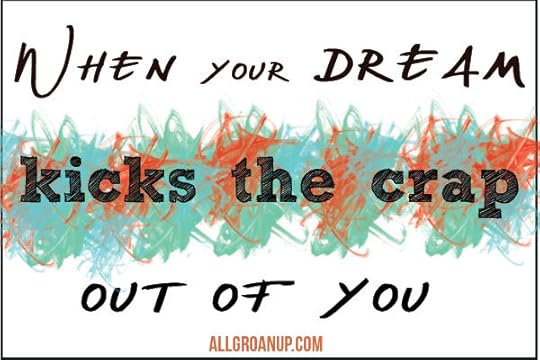
For me the dream that I feel has slipped out the front door has been was the release of my book All Groan Up: Searching For Self, Faith, and a Freaking Job!, which came out about a year and a half ago.
Long story short if you don’t know it — it took about ten years to see All Groan Up actually come to print. So many hours, re-writes, and rejection. Plus in the book I’m pretty open and vulnerable so it kind of feels like my heart is on each page.
And then after ten years and all the rejection from publishers who liked the book but wouldn’t take chance on an unknown author….the book finally comes out…and….a slight breeze. A low whisper. A small marketing budget that helps the book barely make a sound amidst all the noise.
It’s hard to want to create something more when what you’ve spent the most time creating becomes a pebble tossed in a pond, a half-second splash followed by a rapid descent to the bottom.
And honestly I think what gets me the most is that whenever someone reads All Groan Up, it has an impact and it encourages them. It’s rated 4.8 out of 5 on Amazon, better than my first book 101 Secrets For Your Twenties. I’m proud of 101 Secrets and am honored people have liked it, yet All Groan Up was such a huge part of my life for so many years it’s been really hard to let it go.
The dream of All Groan Up finding its wings and soaring like an eagle has been caged.
All Groan Up has been a penguin, waddling slowly forward.
Can you relate to a dream feeling more penguin than eagle? If so, what do we do?
What to Do With an Unfinished Dream
To all of us I say this — be encouraged.
You never know what can, will, or is supposed to happen with the outcome of your dream. All you can do is the work, then you have to let your dream go.
Lay down the bricks and trust that something amazing is being built.
If you’re tied to the outcome of your dream, the results will drag you to the bottom like an anvil. I know it has for me and it took me awhile to find my air.
If your confidence, self-worth, and meaning in life is solely dependent on the outcome of your work – whether it’s a mass success or a mass failure, one way or another, you will be crushed.
Fame and failure has killed too many good souls.
Just because something doesn’t go global, doesn’t mean it’s not good. Sometimes it’s the exact opposite.
You have no idea who is being encouraged or helped by your dream. You might never know this side of heaven.
Yet, if we just focus on doing meaningful work that sparks our soul, it will spark someone else’s. Sparks beget sparks.
Three stories that have encouraged me in this struggle
1. Searching for Sugar Man
This documentary is a must watch for any creative. It encapsulates this struggle about the meaning and outcome of your work better than any I’ve ever seen. I’m not going to give the movie away, but it’s about a 70s singer/song-writer Sixto Rodriguez and the failure and impact of his work. You just have to watch Searching for Sugar Man!
2. The End of the Tour
Just watched this one, a movie based on the true story of Rolling Stone journalist David Lipsky (played by Jesse Eisenberg) following the famed author of the book, Infinite Jest, David Foster Wallace (Jason Segel). It’s not an action thriller by any means, but holy smokes I thought it contained some of the best insight/dialogue on the perils of fame, loneliness, dealing with depression, dealing with failure, etc. (Plus it’s free to watch on Amazon with Prime).
3. Empire of the Sun – Walking on a Dream
I just learned the story behind the breakout song “Walking on a Dream” for the breakout band Empire of the Sun. The story–Honda picks up the song Walking on a Dream and uses it for a commercial. Then people start buying the song like crazy, and bam the song cracks the Top 100 and becomes an instant hit. Well, eight years after it was released.
The song had a slow build for eight years before any of us would ever hear it.
Let Your Dream Go
Serve your dream up. Do your best to help others. Then, let it go. Your dream can’t fly if you’re clinging onto the back of it.
Sometimes God won’t give us “The Big” because he’s saving our lives.
As I first wrote in All Groan Up, yet still need to really hear:
“I was ready to dream big and be faithful in the big. But I was like a newborn colt, put anything weighty on my shoulders, and my legs buckled. I wanted to carry a big worthy cause when the smallest of loads nearly broke my back. The “big” probably would’ve killed me.
If you’re not secure with less, you will be crushed by more. God saved my life by not giving me all those big things I cried out for. No matter how big my temper tantrum.”
You are more than the visible outcome of your work.
And the outcome of your work might be more than what is currently visible.
What might feel like a small pebble, a small sound, a soft whisper, well it might be making a loud splash somewhere important.
You just can’t hear it right now.
September 13, 2016
Countdown of the 7 Most Awkward Coworkers
Awkward and coworkers go together like bad coffee and a break room.
Why is that? Why is there so much awkward at work?
Maybe it’s because the maze of rainy-day-gray cubicles are set up like a D minus science experiment thrown together the night before the science fair.
But the best part about having awkward coworkers? You have no idea just how awkward they until you’re fully employed. And there’s no escaping them!
Let’s take a gander at the 7 most awkward coworkers. Have you worked with one of these? Have you been one of these? Let’s take a look.
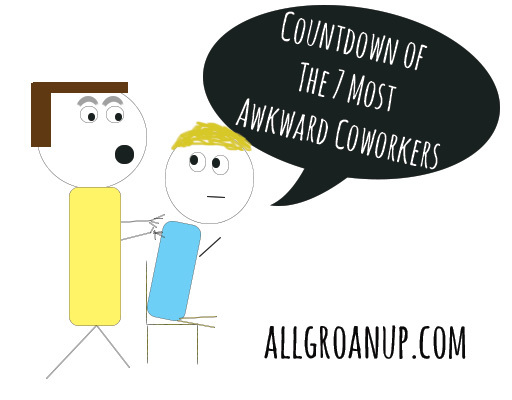
1. The MumbleCore
“What was that, Henry?”
“The report is probably going to be eeldphterent…
“I’m sorry, I didn’t catch the last part.
(sigh) “I said probably it’s an elephant monkey tattoo in the cupboard.”
“Did you just say elephant-monkey tattoo?
(huge sigh, with eyes rolling like bowling balls)
And that right there is the best part about the MumbleCore— their sighs and rolling eyes are the only two things you can hear every time. Without fail.
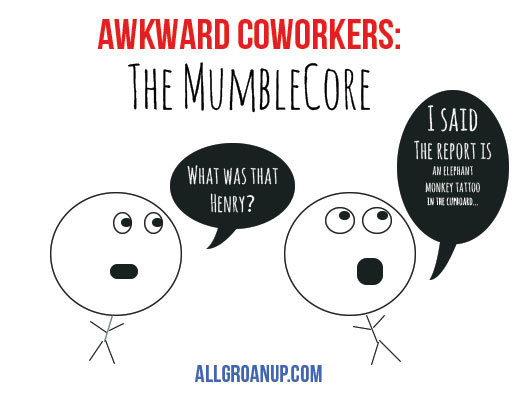
2. The One-Upper
You got a story you think is somewhat amusing?
Think again.
The One-Upper is ready to pounce at the first sign of a pause.
You saw three deer cross the street? He saw nine deer being chased by a mountain lion.
You tripped down three stairs and cut your hand? How cute—he tripped down an escalator and was in the hospital for a month.
You landed a $50,000 account; he landed one worth $5 million.
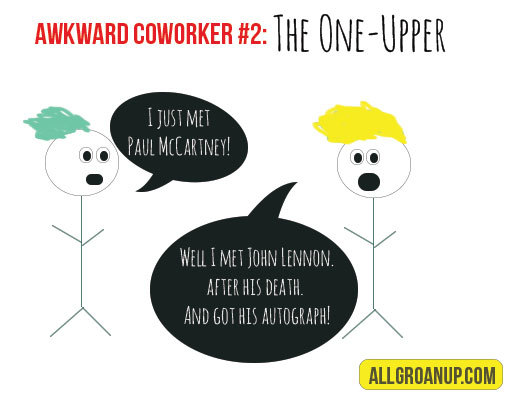
3. The Quick-Clicker
You know they are browsing the internet all day.
They know they are browsing the internet all day.
Yet when you walk over to their desk, they click away faster than Billy the Kid at a shootout.

4. The Shoulder-Rubber
You’re locked in. Focused on a report. About to have a break-through when . . . what in the name of Excel…there’s two hands on your shoulders. And now . . . they’re . . . rubbing!
You’ve been attacked by the Shoulder-Rubber.
They find the moment you’re most focused, sidle up behind you, and start rubbing. Or they just leave both hands on your shoulders for an awkward amount of time with no rubbing whatsoever.
Your best line of defense?
Hunker down and pretend the report you’re working on is so engrossing that you don’t even notice those hands are there.

5. The Email-Only
Walking from their desk to yours takes exactly 23 seconds, if there’s heavy hallway traffic. But the Email-Only wants to keep human interaction at a bare minimum, especially if they disagree with you.
If they ever do talk to you in person, they’re kind and shy, agreeing with everything you say.
Then the moment they’re back at their desk, they unleash a monster through each finger tip, deconstructing your idea, and your soul, in four sentences.
And if you’re really lucky, they’ll cc half the office as well to make sure your idiocy is known across all of Cubicle-Land
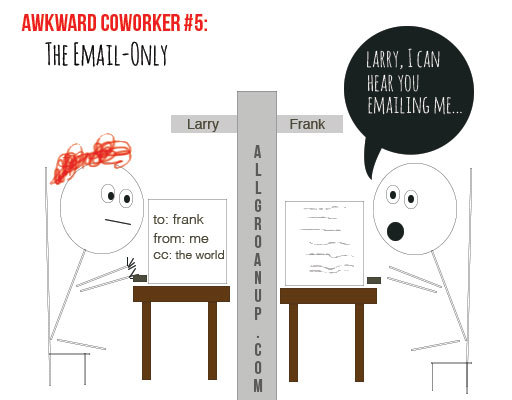
6. The “That Won’t Work”
Got an idea? How nice.
The “That Won’t Work” has five reasons your great idea is worse than filling your pockets with ham before walking into a lion’s cage.
For every idea. You’ll ever have. Forever.
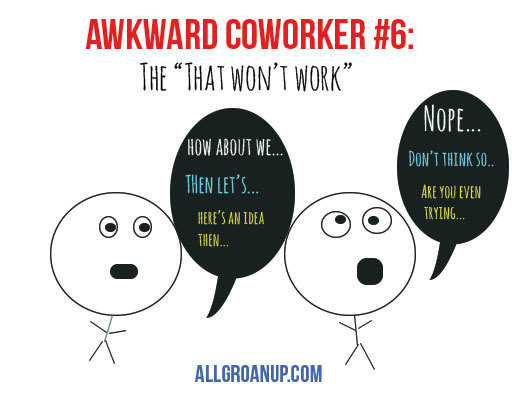
7. The Lingerer
He has no sense of beginning nor end.
The Lingerer lives, breathes, and has his being in the nexus of your doorway, never knowing when to say hello or when to wave goodbye.
So he stands. Obviously yet inconspicuously. Weight on his left foot, hands firmly stuffed in his pockets as he intensely studies the picture of an elm tree on your wall like he hasn’t examined it 332 times before, hoping that someone else will make the first conversational move.
You continue typing, pretending that you don’t see him and if you don’t finish your email in the next minute the world might EXPLODE!.
But the Lingerer knows your game. He’s the 8th grade guy who figures if he just hovers next to a girl long enough, maybe she’ll just ask him on a date.

Awkward Loves Company
But the thing to remember is—the Lingerer or the MumbleCore, yeah, they think you’re awkward too.
And you know what, they’re probably right.
We all have our awkward uniqueness that makes us, well, us.
Quirks are like birthmarks—you live with it for so long you kind of forget its there.
But gosh, 40 hours in the office would be boring if we didn’t have the awkward to spice it up.
When you leave this office and start a new job, it might be the amazing awkwardness you remember the most.
Did I miss any awkward coworker types that you think should be on this list? Or have you ever run into one of these coworkers listed above? I’d love to hear your story (no names included) within the comments in this article.
This article was expanded from secret #37 in my book 101 Secrets For Your Twenties
All cartoons were designed by me, Paul Angone. Any resemblance to any real persons is purely coincidental. Except for you .
August 22, 2016
Why life transitions are brutal (and extremely important)
“Life transitions are like trying to ride a bull at a rodeo. Everyone’s watching. You’re so scared you slightly pee yourself. If you can hold on for just eight seconds, it’s considered an outstanding accomplishment. And when you fall, it’s going to hurt like hell.” – Paul Angone, All Groan Up: Searching For Self, Faith, and a Freaking Job!
We talk about life transitions like they’re so simple. So light and breezy.
I’m just going through a bit of a transition.
No big deal, right?
Wrong.
Life transitions are a huge deal and sometimes the toughest seasons of life to go through.
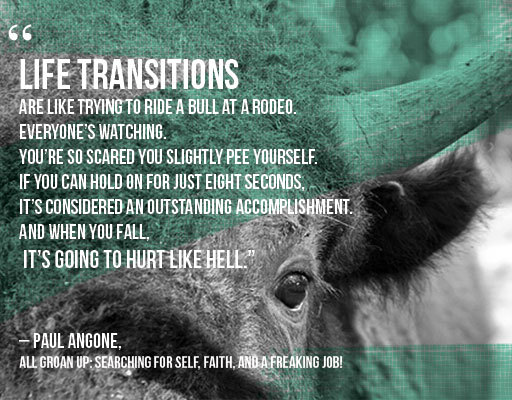
Original Photo Credit: DaniBlanchette via Compfight cc
Transitions come at us in many different forms, and most of the time, when we least expect it.
You show up one day to work and you’re laid off.
You call your girlfriend and she says those four dreaded words — “We need to talk.”
A birth. A death. College graduation. Someone gets sick. Someone moves. You move. Your sanity moves.
Transitions can come like a punch in the gut when you’re looking the other way.
Or the transition is more gradual and less glaring. Every day “the way it’s always been” slowly begins to change and you are forced to change with it.
In every major transition you’re not only breaking up with a season of your life; you’re breaking up with a version of yourself.
Life in your 20s can especially feel like one perpetual transition. You have no idea where you’re going, yet you’re sure you can’t stay here.
As I write in All Groan Up, as I struggled through the long, drawn-out transition of my 20s – “There was blank white walls in front of me, begging me to paint. But I didn’t know what to create and I was too afraid to pick up the brush.”
Why are life transitions so hard?
More importantly, how do we not just survive major transitions, but thrive during the process.
Maybe transitions aren’t something to fly through, but something to marinate in.
Don’t just make it through a transition–make the transition matter.
Transitions are not simply a bridge to the next important season of your life. Transitions are the most important seasons of your life.
There’s something of strange significance that happens to us when we’re stripped of everything we used to depend on.
That’s what I talk through today at more length on top of the mountains in today’s video here. Watch to hear more encouragement from me on not only making it through transitions, but making them matter.
Also you’ll get the extra bonus of hearing my incredible English accent. And my one in a million trick spit-shot I pulled off in the middle of the video.
August 3, 2016
9 Questions You Need to Ask About Your Career
Do you have big questions about your career? (or lack thereof)
Searching for a career is more than just finding a job, it’s about finding a place to call home where you can thrive and grow in.
I believe it should matter that you want your work to matter.
You will spend more time working than you will anywhere else. Don’t you think it should feel like a good fit, instead of something that’s forced? If you’re always trying to kill time at work, what does that say about the way you’re spending your life?
If you’re struggling with your current career, are confused about the direction it’s heading, or just want to re-confirm you’re on the right one, here are nine questions you need to ask.

1. Are the people who have obtained success in your career path, you know, actually happy?
When you look at the higher ups in your field of work, the people who have really made it, are they happy? Are they living a life they enjoy or are they doing just the opposite?
As I wrote in twentysomething problems, if the thought of doing your bosses job 15 years from now makes you throw up a little, then maybe that’s a sign you’re in the wrong job.
2. The moment right before you enter into your day’s work, how do you feel?
Tomorrow right before you begin your work, pause, ask yourself this question, and see what you say. Are you excited? Anxious? Overwhelmed?
You might be surprised that you find yourself thrilled to begin another day of work. That’s a great sign! Or maybe you notice that dread is slowly wrapping its fingers around your neck?
How you feel the moment before you begin your day will tell you a lot about how you will feel when your day ends.
3. What’s your Dread/ Tolerate/ Love breakdown?
Let’s make a chart! This will be fun!
Look at a typical work day. Break down each hour. From email, to meetings, travel, and then when you’re actually plugging away at the work you’re supposed to be doing.
Looking at your breakdown, how many hours would you place in each category – Dread, Tolerate, and Love.
Now take your hour breakdown and make it into a pie chart. Does this pie chart make you nauseous or happy? If your day is filled with more dread than love, is there a way you can tackle more projects in your “Love” category?
Is there a way to spice up some of those Tolerate hours to make them fit better within your wheelhouse? Or is this career taking up permanent residence in the Land of Dread.
Define what you love about your job and then refine your job to do more of what you love. (tweet that?)
4. Or do you feel you’re full throttle-ly (that’s a word, right?) employed in a crappy job and it would take an act of God to help you enjoy it?
A crappy job can feel like a black hole — it sucks and feels impossible to escape.
Yes, working a crappy job is a twentysomething rite of passage. But how do we make it smell a little better?
The key to working a crappy job, and then leveraging that job into a better one, is to find and hone your One Thing.
Find and focus on the One Thing you like about this job.
Then do that one thing even better than before. Grow your skill-set there. Learn from co-workers who do that One Thing well.
Make that One Thing your crappy job trampoline, bouncing you to greater heights.
Your twenties are about putting in the work now so that you can enjoy your work later. (want to tweet that?)
Too many of us want to escape our crappy jobs before we’ve grown in a skill-set that we can leverage into a better opportunity. If you leave your crappy job without learning and growing, chances are another crappy job awaits.
5. Does studying, researching, and becoming more proficient in your career give you energy or drain it?
Does learning about your industry or craft give you life or take from it?
If becoming a master of your craft is something you’re avoiding, it’s either time to fully dive in or it’s time to pick a new craft.
6. Does this career path create the life you want?
Sometimes you can have an amazing career, but the wake from it is choppy and uneasy.
Do you love your job, but it’s pretty much a given that you’re working 70 hour weeks? And your boss works 80. Or maybe your career is filled with purpose and passion, yet it doesn’t really pay the bills? Basically, what’s most important to you? If you’re not sure, maybe start with these 11 questions every twentysomething needs to ask and then come back here.
It’s a strange paradox when you love your job, but you don’t love the lifestyle it creates.
Choose a healthy life, not just a successful career.
This might mean you have to make a difficult decision about the kind of life you want to live. But I promise it will be easier to make that choice now, than when a house, spouse, and a few kids are in the picture.
7. Are you doing work that matters? Do you believe in it? Should you believe in it?
Boomers and Millennials especially sometimes find themselves at a disconnect when it comes to career choices.
And it seems whether or not you should have purpose and meaning in your career is at the heart of the debate.
I believe it should matter that you want your work to matter. ( tweet that )
For many twentysomethings, they are more focused on finding a job filled with purpose and passsion, than a healthy paycheck.
As a recent Barna study on Millennials states: “When it comes to work and career, more than anything this generation wants to be inspired. Finding a job they are passionate about is the career priority Millennials ranked highest.”
For me personally, doing something that makes an impact in a meaningful way was a number one priority for me. It was a non-negotiable. And it’s compelled me to make hard choices away from comfort and job security. It’s led me through seasons of unemployment and utter leanness. And it’s meant a lot of early mornings and late nights working at a dream, before I went and worked at my work.
This path towards meaning has not been easy, but I love where it’s led me.
8. What are the top skills that you currently using and growing at your work? Are those skills you want to be harnessing and focusing on?
Write down the top 3-5 skills you’re using and developing at work? Or if you’re not working, the top skills you’d like to be developing.
Are those skills you want to be developing? What deeper values are those skills tied to?
I’ve found that many people get stuck in their jobs because they are doing something they find success in, yet they feel this undercurrent of discontent and frustration because the skills they’re using are tied into anything deeper.
Success in your skill-set alone is not your purpose. Your skills should be infused in pursuing something purposeful, but your skills are not your purpose in and of themselves.
Sometimes what we’re good at can become a comfortable trap from living a life away from our true purpose because we’re using skills apart from what we think is important — our “why” – our full Signature Sauce.
9. Do you even want a career?
Career sounds stuffy and inescapable like getting lost in the back of your Aunt Martha’s closet.
The world is flat now with the ability to work anywhere, on anything, at anytime. I’m not sure the standard ideas and concepts behind a linear career are completely relevant any longer.
I don’t think our generation will as readily climb the ladder. Our generation will swim from island to island, picking up necessary skills and experiences as we travel towards our Promised Land.
Right now take the time to answer a few of these questions within the comments on this article at All Groan Up. I promise it’s worth the time. Be intentional about your career and watch the doors begin to open.
And I’d love to give you feedback on at least one of your answers in the comments section.
July 13, 2016
How to Find Your Purpose in the Most Unexpected Place
Do you feel like you’re struggling to find your purpose in life?
Well, if I might be so brazen, I know where you should look.
And it’s probably the last place most people think to go to find their purpose.
At least, I know it was for me.
On the Hunt for Purpose
If you’ve read my newest book, All Groan Up: Searching For Self, Faith, and a Freaking Job!, you know I wasn’t exactly pursuing my purpose for many years. I felt stuck in a cubicle. I felt frustrated, bitter, and broken.
All the big dreams that once burned inside of me, began to sizzle out like a sparkler on a summer sidewalk.
I wanted to pursue my purpose and passion, but I began to wonder if the pursuit was pointless. That all this finding your passion and purpose talk was in fact a Millennial farce like so many people paint it to be.
So I began to write.
In a broken down motel room with four locks on the door is where I wrote my first page — as I stared at the door and wondered why three locks wasn’t enough?
From that night on, I wrote everywhere I went.
And yet for most of that first year writing, I didn’t even know what I was writing about.
So I wrote about the struggle. I wrote about the unanswered questions. I wrote about the frustration, the problems I was facing that I didn’t have an answer for.
That’s when it began to happen. I began to find my purpose in the least expected place.
I began to find my purpose in my biggest problems.
We don’t find our purpose despite the struggle. We find our purpose smack dab in the middle of it. (click to tweet that)
As I stared at my biggest questions and frustrations about trying to find my purpose, passion, and place in my 20s, and I failed to find any simple answers, a passion began to boil to help others who must be experiencing the same problems.
Often times our purpose is disguised as our biggest problems.

Photo Credit: lab604 via Compfight cc
Failure doesn’t ruin your story. Failure helps you write it.
The most significant achievements typically aren’t birthed out of inspiration; they are squeezed out by necessity. (click to tweet that)
You see this idea played out in most of the greatest inventions, movements, and social changes throughout history.
Two quick examples:
I just watched the movie Joy — based on a true story of inventor and QVC host Joy Magnano. She stumbled upon her purpose as an inventor and TV host due to a problem she experienced daily in her home — her old mop was disgusting, she had to ring it out with her hands, and it didn’t work very well. So she invented the Miracle Mop on her path to becoming a millionaire entrepreneur.
In the book Red Notice, Bill Browder tells his amazing and harrowing true story of being the most successful US investor in Russia. Through his subsequent problems of then meeting the ugly face of corruption face to face and the people he loved who it tried to destroy, he went from making millions through investments to being one of the most vocal advocates in fighting for social justice and human rights in Russia.
What are Your Problems Telling You?
If you’re struggling to find your purpose, look to your problems.
What are they telling you? Is there a path or solution waiting to be discovered that you just haven’t seen yet?
Your passion is driven by the deep desire to solve a deep need.
You can only find your passion when you’ve failed miserably at something, yet the next day you want to do it again.
When you’re truly passionate about something, it becomes something you cannot, not do. (click to tweet that)
If you’ve gone through something painful you will do more to help alleviate that pain for others than someone who has never experienced that pain themselves.
Your pain and your problems become redeemed on the pathway to helping others overcome the same things.
So if your purpose feels lost at sea, you can’t give up now.
Your greatest purpose might be found in your greatest problems.
(Your calling is) the place where your deep gladness and the world’s deep hunger meet.” – Fredrick Buechner
Your struggles aren’t a distraction from your calling, sometimes your struggles are the pathway to it.
Just like the butterfly who can only fly because of the struggle out of the cocoon — you need the struggle to prepare you for your purpose.
You need the struggle to infuse in you the grit, perseverance, and humility it takes to produce change.
The Gift of Problems
Your biggest problems might be your purpose waiting to be unwrapped.
Like the most meaningful present you could ever open, yet covered in barbed wire. It looks nothing like the gift you’d expect, yet inside is meaning, resolve, grit, and a passion you didn’t know you had.
Look at your problems, and you might find your purpose waiting there with a slight, knowing smirk.
(I go much deeper into the 6 ways to identify a problem in your life that you might turn into your purpose and passion within my Finding Your Signature Sauce online course. And I’m letting everyone preview the entire lesson and workbook questions right now for free.)
July 6, 2016
Struggling with The New OCD – Obsessive Comparison Disorder
What’s keeping us from having authentic conversations and relationships?
What’s heaping upon us unneeded anxiety, fear, and feelings of failure — and then we wonder why we’re struggling to move forward in our lives?
We all struggle. Yet, we’re all struggling to make it appear like we’re not struggling. (click to tweet that)
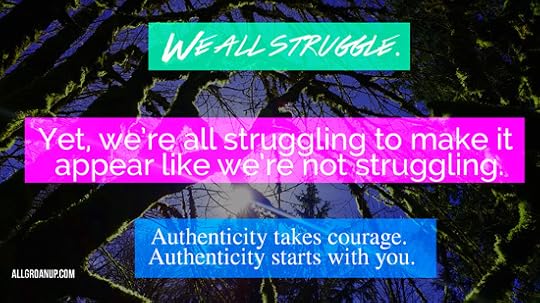
The biggest problem I see? The New OCD — Obsessive Comparison Disorder.
Comparison is the thief of joy.” – Teddy Roosevelt
Wort of all — Obsessive Comparison Disorder isolates us.
It’s hard to talk about the hard stuff in our lives if we’re constantly trying to make it appear like nothing in our lives is hard.
I first defined and wrote about this new OCD — Obsessive Comparison Disorder — in 2011 in this blog here at All Groan Up about the crazy-making of comparison. Then I wrote about it more in my book 101 Secrets For Your Twenties and even in recent articles like this one on Relevant magazine.
However, this week I climbed up to the mountains to talk even more honestly about the effects of Obsessive Comparison Disorder and how we stop it.
I even talk about something Obsessive Comparison Disorder compels me to do that I’m not proud of (hint: it might involve raw cookie dough).
Watch the video of me discussing the effects of Obsessive Comparison Disorder and how we stop it.
As I wrote in 101 Secrets For Your Twenties,
“We need to sail on our own ship instead of drowning trying to swim to everyone else’s.”
We need to stop our Obsessive Comparison Disorder before it completely stops us.
How is Obsessive Comparison Disorder effecting you and how do you begin to cure it? Watch the video below to find out.
I’d love to hear your thoughts about Obsessive Comparison Disorder in the comments on this video or within the comments here at All Groan Up.
June 21, 2016
Failing at your 20s? You are in Famous Company
Your 20s not going as planned?
Perfect. You’re in great company.
And I’m not just talking about the two million 20-somethings currently blogging about their quarter-life crisis.
No, failing in your twenties is a historical rite of a passage. Like being sent out into the wilderness to kill a lion — naked, blindfolded, and wielding a dull stick.
But is experiencing a quarter-life crisis such a terrible thing? Here’s why our 20s detour into the wilderness puts us in the best company imaginable.
The Fabulous and Famous who Failed Their Twenties
Abraham Lincoln – 16th President
If you made it through 5th grade, you’ve heard of this guy. But if you would’ve known Honest Abe when he was thirty years old, you would’ve only known him as a lovable, gangly, unfortunate loser.
Let’s see… 
23 years old — Abe runs for the Illinois General Assembly. He’s defeated. By a country mile.
24 — He opens a village store. Same year the store goes belly-up.
25 — He falls in love with Anne Rutledge. At 26, Anne dies.
27 years old — Begins serious pursuit of Mary Owens.
28 years old — Asks Mary Owens to be Mrs. Lincoln. She declines.
Abe enters his 30s struggling with depression along with relationship and political defeats.
Abraham Lincoln tragically exits this world too early in his 50s as the savior of the United States.
Morgan Freeman – Actor Extraordinaire
“Jobs were hard to come by and he continually went hungry, often starving for days before he’d ask his friends for help.” – Morgan Freeman Bio
At 22 years old, Freeman moved to LA to become an actor and landed an amazing role — transcript clerk at LA city college.
I went to Hollywood straight away. I got a good running start but the wall was brick.” – Biography Channel, Morgan Freeman
Freeman moved back to New York, taking any role he could. The first time he received a leading role — the play closed in four nights.
Freeman entered his 30s playing bit parts on the Electric Company — a Sesame Street-esque TV show, with his marriage about to end in divorce.
Today he is one of the highest grossing actors around.
Parker Palmer – Best-selling author, activist, teacher
“As the darkness began to descend on me in my early twenties, I thought I had developed a unique and terminal case of failure. I did not realize that I had merely embarked on a journey toward joining the human race.” Parker Palmer, Let Your Life Speak
Parker Palmer left college assured he was to do God’s work, so he enrolled in a theological seminary. And after a year bathing in Bible, bad grades and a bruised ego, he left.
Most of us arrive at a sense of self and vocation only after a long journey through alien lands.” Parker Palmer
After struggling through his 20s filled with ought’s, should’s — searching for status and praise, Palmer found himself entering his 30s and a small Quaker community. A place that promised a personal reset.
“I was in my early thirties when I began, literally, to wake up to questions of about my vocation.” Parker Palmer
You are Right Where you Need to Be
Our 20s aren’t about sheer success. Our 20s about perseverance and preparation.
As I wrote in my book 101 Secrets For Your Twenties,
Failing means you’re simply finding a more profound way to be successful, if you’re willing to learn from it, and then have the courage to possibly fail again. And possibly more profoundly than before.
We can’t let failure be our death sentence instead of just one more sentence on the page before we turn it to the next. If we go for it, we will fail. We have to. That’s part of lifting a weight heavier than you. You tear your muscles so that they can become stronger.
The only real failure of our 20s would be if we never had any.”
Sure there will be the Mark Zuckerburg’s of the world who wipe their rear-ends with billion dollar bills.
But the heroes in the history books who kicked status quo in the ass, often failed the biggest in their 20s.
Failure can be the best clarifier in life.
Failure doesn’t ruin your story. Failure helps you write it. (click to tweet that)
Feel like you’re failing your 20s? You’re in famous company.
Do you feel like you’re failing more than you’re succeeding in your 20s? You’re not alone. Join the conversation and tell us your story within the comments on this article.
Photo Credit: DonkeyHotey – Creative Commons
June 14, 2016
Why You Need to Work an Adventure Job in Your 20s
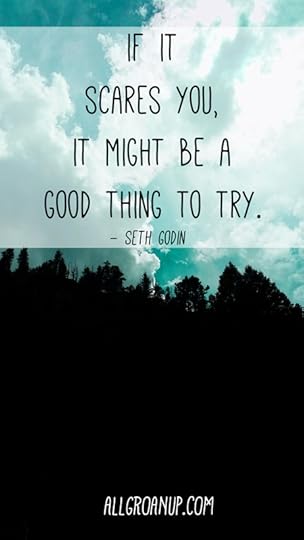
The dark, mountain sky enveloped me.
Just ten minutes before I was asleep. Now I was miles away from my bed, alone in a wide-open field, listening to the sounds of animals circling me.
How in the world did I end up here?
A loud snort. A scratch of the earth. Pitch black sky so thick and dark I could eat it with a spoon. I couldn’t see the animals, but as the noises grew louder I knew they were beginning to run right at me!
I stood motionless as what felt like 2,000 pound ghosts ran past, one after another, the force of their bodies passing by, hitting me with gusts of wind like a train.
You see, I was working at Deer Valley Ranch as a wrangler in the Rocky Mountains of Colorado.
I probably should’ve been working at a prestigious internship in a prestigious office. I probably should’ve been clawing my way up some career ladder with broken rungs.
Instead, I was almost getting stampeded by horses who had busted out of the corral in the dead of night.
And I was loving every second of it.
Plus I realize now that I was gaining more life skills than I ever could’ve imagined or planned that I’m still benefiting from today.
That’s why I believe working at least one “adventure job” in college, in your twenties, or whenever you can make it work, is the smartest, most valuable, most strategic job you could ever work.
Why Everyone Needs to Work at Least One Adventure Job
Adventure Job — my definition: “A job completely off your “career path” and completely out of your comfort zone that challenges you and hones in you life skills, character, and work ethic that will benefit you in any later career you might work.
I think we become so obsessed with getting on the “right” career path that we miss exploring and taking risks that will help us figure out what the right career path even is.
Too often we sacrifice what will actually transform our lives for what we think looks good on paper.
Yet, I think working an adventure job is actually the most strategic job you can work to benefit your long-term career growth.
Adventure Job? I Can’t Do That!
Before I get to more reasons why I think all of us should at least work one adventure job in our lives, let me start first with all the people thinking right now —
An adventure job sounds nice, Paul. But there’s a better chance of icebergs forming in Death Valley than me being able to pull off working an adventure job right now.”
I get it.
Life becomes increasingly complex with every added year. Add a spouse. Kids. Student loans. A house. A car payment. And soon you feel like you have about as much flexibility as a block of wood.
Yet, that doesn’t mean an adventure job is an impossibility. I’ve had multiple married friends recently quit their jobs to go teach English in a foreign country.
Or you don’t have to do an adventure job as your full-time gig. Maybe it’s more of a volunteer opportunity on the side.
Or maybe your “adventure” job isn’t in the actual wilderness, but in a career field that feels way outside of your comfort zone.
One way or another, if you’re feeling stuck in your career, an adventure job might be the best thing to get you un-wedged.
3 Reasons You Should Work or Volunteer in an Adventure Job
1. Building “Identity Capital”
I recently had the chance to speak at a conference before Dr. Meg Jay, author of the Defining Decade and speaker of this famed Ted Talk. As she spoke, she told a story of working at Outward Bound, a wilderness, backpacking, leadership program in Colorado.
Here’s an experienced and well-known psychologist with two Ph.D’s, who like myself, is still telling stories about her adventure job and the life lessons it taught her.
Dr. Meg Jay talked about one of the most important pieces of being successful and intentional in your twenties is working jobs that instill in you “identity capital”.
Basically — is the job you’re working helping build and construct your identity in a positive way? Or is it subtracting from it.
Or as the director of Backdoorjobs.com Michael Landes describes on his site: “Does the opportunity have heart?”
If a job opportunity doesn’t have heart, then maybe you shouldn’t invest yours in it. (click to tweet that)
2. Real Leadership/Grit/Humility/Perseverance Experience
Nothing will teach you more about leadership than working a job where lives are literally hanging in the balance of your decisions.
When I was working as a wrangler there were numerous instances where split decisions needed to be made. In the middle of the wilderness. With a handful of people on horseback depending on me to make the right decisions.
In an adventure job, leadership is not a theory. It’s something lives depend on.
Hard work isn’t a metaphor, it’s the daily norm.
When you’re literally up to your knees in a corral full of horse manure (after numerous rain storms!) it gives you a different perspective on how to truly work through the “crap” of any job.
3. The Best Career Stories!
Let’s say in your next “real official job” interview, they asked you the standard — “Can you tell us of an instance where you had to overcome a challenge or tough circumstance on the job?”
Now what if your answer was something like this below: (this is an actual story from my time at the ranch)
“One time I was leading a group of people up a narrow mountain path on horseback about 1,000 feet from the ground, when my horse got spooked and tried to quickly turn around. This unfortunately put his feet over the edge of the cliff and I could feel us beginning to go over the edge.
So in a split-second reaction I dove off the horse towards the mountain, and pulled the reigns with me, smashing me down on the ground with the horse swinging his body towards me and almost landing right on top of me.
My heart was beating like crazy because, you know, I almost went off a cliff. Yet we had two hours and many miles left on the trail to get to our destination. I could tell the guests who had just seen what happened were petrified, and frankly so was I. Yet, I had to simply jump back on my horse and keep leading the ride with confidence because I knew that if I let my fear take over we all were in big trouble.”
I think a story like that might make a bigger impression than telling a story about the time you got coffee for your whole office at Starbucks and they messed up the order.
Why Not Have a Career Adventure?
The first step to exploring is getting lost.
Getting lost and exploring are pretty much the same thing. The biggest difference is explorers get lost on purpose with purpose.
Maybe it’s time for some intentional lostness?
Maybe it’s time to get off the standard career path and start constructing your own?
Maybe it’s time for a career adventure?
Have you ever worked an “adventure job?” I’d love to hear about your experience within the comments in this article.
May 27, 2016
How to Lead Millennials from a Millennial
Today All Groan Up welcomes this insightful guest post on leading Millennials from Lukas Pesa. Enjoy!
For all the millennials out there, have you ever noticed that there is sometimes a divide in companies between mid-to-entry-level workers (us) and big-wig managers at the top of the food chain?
What’s the reason for it?
In order to create a productive work environment, division isn’t exactly the most conducive thing for millennial engagement.
In the book Millennial Momentum: How a New Generation is Remaking America, by Morley Winograd and Michael D. Hais and they take my thought a step farther — high trust and a lack of division in the workplace leads to prosperity.

It only makes sense that when managers have an attitude of superiority that creates division, it lowers the productivity of the overall organization, right?
Quick story of how a more open environment can be beneficial in an organization (particularly for millennials). A videographer was hired to work on a political campaign in 2008 for a charismatic figure named Barack Obama (maybe you’ve heard of him) and was given the job of taking hours of video and using it to tell the story of the campaign. There were a few things that made the work environment unique right off the bat:
The office was in the shape of an ‘O’, preventing any hierarchy of having corner offices.
If there were any cubicle walls, they were very low, and completely transparent glass walls encased all meeting rooms. The theme of transparency and equality was literally built into the office.
The videographer was welcomed by the media team, all of whom were millennials without any sense of ego or rank.
With the equal environment created by the Obama campaign, the eventual President Obama gave his campaign staff all the credit for his victory: “You lifted me up and pulled me across the finish line…You created the best political organization in America. (The presidency) is a great gift you gave to me.”
Now, obviously I’m not preaching for every company out there to burn their cubicles and curve their walls.
But, with that true story in mind, and with the benefits of creating a unified environment where everyone can interact without being intimidated by any of the higher-ranking managers, I think it makes sense that transparency and teamwork are great ingredients to increase productivity, especially with millennials.
Here are some stats I found on the subject.
39% of surveyed employees believe that people in their own organization don’t collaborate
About 75% of employers rate teamwork and collaboration as “very important”, yet only 18% of employees get communication evaluations at their performance reviews.
86% of employees and executives cite lack of collaboration or ineffective communication for workplace failures. Being distant and unfamiliar with millennials will make them tense, and by extension, uncomfortable in the workplace.
90% of employees who responded in a survey believe that decision-makers should seek other opinions before making a final decision, yet 40% of employees believe that decision makers “consistently failed” to seek another opinion.
So how can executives, manager, and leaders make the best possible environment for their youngest employees?
Be. Social. With. Them.
Make millennials feel comfortable enough with you that they can talk to you about things that may not pertain to work.
Let them feel like they can approach you, even if they have to ask you questions about how they can improve in their work.
I know too many millennials who have had a slower-than-necessary improvement rate because they were too intimidated by their manager’s imposing personality to ask questions.
For managers that work with millennials, how many of these questions can you answer regarding your millennial employees?
Where did your millennial employees go to school?
How many siblings do they have?
Do they have any big family events coming up?
Do they play sports? If so, which ones?
What do they do in their free time?
Now it is not necessary to know all these details about millennial employees. I mean after all, they are your employees not your friends from high school. But in my experience, the managers who are able to talk to their youngest employees about all things have a tendency to get better results from them.
Get to know millennials on a personal level and they will begin to interact and perform as colleagues not subordinates.
Lead them to do great work because they want to, not because they’re paid to.
——
Lukas Pesa is a recently graduated branding coordinator from Toronto whose background in public relations has kept him interested in the media and social trends. Lukas is interested specifically in the trends being set by millennials in business and how businesses can better leverage their millennial talent to work more effectively and efficiently.
May 25, 2016
Millennials — Your Big Dreams are NOT the Problem
Millennials get knocked for having big dreams. As if having goals, plans, and wanting to do something significant with your life is a personality flaw.
Millennials want to live on purpose with purpose.
How’s this a bad thing?
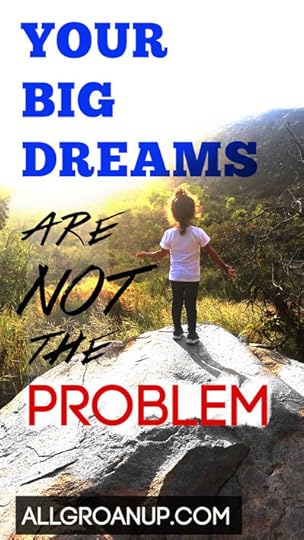
Staying optimistic, even as all the “reality checkers” are telling you “that won’t work”, is something to be commended – not scoffed at.
Yet, there is a problem.
There is something that will keep you from ever seeing those dreams come to fruition.
There is a problem that we need to understand and overcome if we’re going to make our big dreams a reality.
Here is The Problem to Pursuing Our Dreams
Your big dreams aren’t the problem. Your timeline is.
As I first wrote in 101 Secrets For Your Twenties,
“Our big dreams aren’t the problem. Our crazy timeline of how quickly we want those plans and dreams to be sitting on our doorstep with a big Christmas bow is the problem.”
For me personally, I thought the red carpet was going to be rolled out on Day 33 of life in my 20s when God had that penciled in for Day 2,333.
You know, for when I was actually ready for it.
God has His timeline for your life. You have your timeline for your life. Some of the time those match—like on that one Tuesday in February, three years ago. But most of the time they don’t.
We could try and hold tight to the uncontrollable, gripping the details of our lives like a five-year-old trying to walk a rhinoceros.
Or we can let them go and do their thing. We can drop our dreams deep into the ground and water them with creativity, consistency, and patience.
Don’t let your timeline blow up the timeline that needs to happen.
Keep Growing Your Dreams
As I wrote in All Groan Up: Searching For Self, Faith, and a Freaking Job!
“Don’t chase your dreams, grow one. Plant them in good soil and consistently water it. Then trust that God will spark life underground.”
When it’s the right time, we’ll watch our plans and dreams grow bigger, better, and more beautiful than we ever could’ve planned.
Most of the time life will not feel like “it’s supposed to” and that’s exactly how it’s supposed to be. (click to tweet that)
Keep believing that in the small, daily grind something big is taking place.
And that the big outcome might not look anything like the portrait you painted of success while dreaming at the starting line.
Hold your dreams tight as everything tries to rip them away.
Keep warring for hope as everything feels like it’s warring against you. (click to tweet that)
Sometimes life in your 20s and 30s is about having the courage to write a couple crappy first drafts. Then after 5 re-writes, you start finding the story you need to live.



